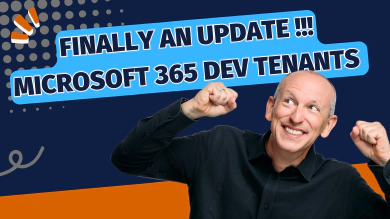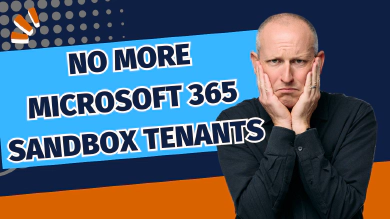The Microsoft 365 Developer Program launched in November 2020, and by March 2021, it began offering developers a free Microsoft 365 tenant. This developer tenant was also referred to as a sandbox, or instant sandbox, tenant. The tenant included sample data and multiple user licenses for developers to create and test solutions for Microsoft 365.
Provided the tenants were used for development purposes and not misused, Microsoft would renew them annually. Since their introduction, I’ve advised all my students to join the developer program and create a developer tenant to use as a hosted development environment for testing their Microsoft 365 solutions.
This was a great option for learning and testing! Not only was it identical to a commercial Microsoft 365 tenant, but it was FREE! There’s no difference between a developer tenant and a commercial one, except that developer tenants are free, expire after a year, and are monitored to ensure they’re used for development. If they are, they’re automatically renewed. If not, they expire after a certain period.
But, in January 2024, they stopped providing these tenants unless you in one of their ISV, partner, or Visual Studio subscriber programs programs.
You can learn more about what happened and why from my previous article on the developer program:
Understand the recent changes in the Microsoft 365 Developer Program, why they were made, and when you can get a free M365 developer/sandbox tenants again.
https://www.voitanos.io/blog/microsoft-365-developer-program-status-summer-2024/

Status Update as of April 2025
Finally, I’ve got a good update for the Microsoft 365 developer tenants!
In my article Microsoft 365 Dev Tenants: A Paid Model Could Save Them, I proposed a solution to Microsoft for reopening the Microsoft 365 Developer Program’s developer tenants that were discontinued in January 2024. The article included an open request for you to vote and share how losing these tenants affected you. More than 20 of you responded, adding to the numerous comments I’d already received on my previous articles, YouTube video, and social media posts!
I brought your feedback to Microsoft’s MVP Summit in March 2025 where I had the chance to raise this issue, or rather, make an impassioned plea. While I’m bound by NDA and can’t share specific details of what I learned, here’s what I can tell you:
I raised the issue & Microsoft’s response was honest, direct, and clear, leaving me confident that they not only understand the issue but are actively working on it. While I don’t think it’s appropriate to disclose who at Microsoft answered the question, I can say that I trust the person who responded, they are in a position to impact change, and my follow-up conversations with them since the MVP Summit have reinforced this feeling.
My takeaway: I’m optimistic & anticipate we’ll hear from Microsoft to learn more about the M365 developer program and dev tenants within the next few weeks/month.
The Uncertain Future of Microsoft 365 Developer Tenants
It’s now March 2025, and there is still no news from Microsoft regarding the status of the Microsoft 365 Developer Program and the free developer tenants that were originally made available in March 2021. When Microsoft abruptly stopped providing these free tenants after a major security breach in January 2024, they assured developers that these tenants would be available again around September 2024. Then, during a public AMA session at a conference in August 2024, they revised that timeline, suggesting it would be late 2024 or early 2025.
Yet, as we approach the end of Q1 2025, there has been complete silence. Countless inquiries — both mine and those from the developer community — have gone unanswered.
The Impact on Developers
This uncertainty is frustrating and raises serious concerns about Microsoft’s commitment to the Microsoft 365 developer community. Developers working on Microsoft 365 Copilot, Microsoft Teams apps, the SharePoint Framework (SPFx), Microsoft Graph, and many other areas of Microsoft 365 development are left without a reliable environment to test and build their solutions. Without developer tenants, onboarding new developers into the ecosystem becomes significantly more difficult. Instead of simply expressing frustration, I want to propose a solution that benefits both Microsoft and its developer community.
Currently, the cheapest available option is a $6 per user/month Business Basic license, which totals $72 per year for one user. The proposed paid developer tenant model would offer a significantly better experience for $99 to $200 per year, including 5 users and a full-featured development environment tailored for testing and demos.
A Paid Microsoft 365 Developer Program
While many platforms offer free developer programs like Google, Salesforce, and Amazon’s AWS, some organizations charge developers for access to a development environment. For example, Apple has long required developers to pay $99 per year to participate in its program for iOS and macOS development.
A similar approach could be applied to Microsoft 365. Developers using Microsoft 365 are not doing so as a hobby; they are professionals building business solutions, whether as full-time employees, consultants, or independent developers. They need a stable and accessible development environment.
A reasonable solution would be for Microsoft to introduce a paid developer tenant program with an annual fee in the range of $99 to $199. This model would provide access to a Microsoft 365 tenant with well-defined limitations that prevent abuse while ensuring it remains functional for development.
Constraints of a Paid Developer Tenant
To strike a balance between usability and security, these developer tenants would need specific restrictions.
Limited User Licenses
Instead of the previous 25 E5 licenses, this new model would provide only 5.
Fixed Developer Use Domains
The tenant domain would be non-customizable, ensuring that every developer tenant follows a standardized format, such as devtenant-[uniqueID].onmicrosoft.com, making it unmistakably clear that the tenant is for development purposes only.
Low Email Quotas with Forced Headers and Footers
One of the key issues with the previous system was that developer tenants were used to send phishing emails at an alarming scale during the 2024 security breach. To mitigate this risk, all outgoing emails from these new developer tenants should include a mandatory header or footer explicitly stating that the message originates from a developer account. Additionally, a daily email quota could be set at 100 emails per user, preventing mass email abuse.
Limited Storage
Storage should also be restricted to 1% of what is currently available in commercial tenants. Instead of the 1TB of SharePoint Online storage plus 10GB per user, these developer tenants would have just 10GB total plus 100MB per user. Similarly, OneDrive, which currently provides 1TB per user, would be reduced to 10GB per user in developer tenants. These limits ensure that developer tenants are used strictly for testing and development, rather than as an alternative to paid commercial tenants.
Limited Add-on Entitlements
Some premium features would also be restricted. For example, Microsoft 365 Copilot licenses would not be included, though developers could still use the metered Copilot chat option. Limiting optional entitlements ensures that developer tenants remain focused on core development needs.
Developer-Focused Enhancements
While constraints are necessary, there are also several features that would enhance the developer experience.
Content Packs
One such feature could be preloaded content packs, allowing developers to quickly set up test environments with sample data.
Content Reset or Easily Delete/Recreate Tenants
Another useful addition would be a reset button, enabling developers to wipe and reprovision their tenant with default configurations at any time. Furthermore, a subscription-based model would allow developers to cancel at their convenience, ensuring they only pay for what they need.
Commercial vs. Developer Tenant: A Comparison
To better illustrate how this proposed developer tenant would compare to a standard commercial tenant, consider the following:
| Feature | Commercial Tenant | Proposed Developer Tenant |
|---|---|---|
| E5 Licenses | 25 | 5 |
| Custom Domain | Yes | No |
| Email Sending Limit | No limit | 100 emails per user/day |
| Email Footer/Header | No | Required |
| SharePoint Storage | 1TB + 10GB/user | 10GB + 100MB/user |
| OneDrive Storage | 1TB per user | 10GB per user |
| Copilot Licenses | Available | Not included |
| Premium Features | Full access | Limited |
| Sample Data Packs | No | Yes |
| Reset/Reprovision | No | Yes |
Speak Up & Make Your Voice Heard
This proposal benefits both Microsoft and developers. For Microsoft, it ensures that developer tenants are associated with verified individuals, reducing the risk of abuse. For developers, it provides an accessible, structured way to build and test Microsoft 365 solutions without relying on costly commercial tenants.
If you support this idea—or have other suggestions — make your voice heard! Comment below or share your thoughts with Microsoft. If enough developers advocate for this, we may see a viable solution that restores access to developer tenants in a sustainable and secure way.

Microsoft MVP, Full-Stack Developer & Chief Course Artisan - Voitanos LLC.
Andrew Connell is a full stack developer who focuses on Microsoft Azure & Microsoft 365. He’s a 20+ year recipient of Microsoft’s MVP award and has helped thousands of developers through the various courses he’s authored & taught. Whether it’s an introduction to the entire ecosystem, or a deep dive into a specific software, his resources, tools, and support help web developers become experts in the Microsoft 365 ecosystem, so they can become irreplaceable in their organization.






